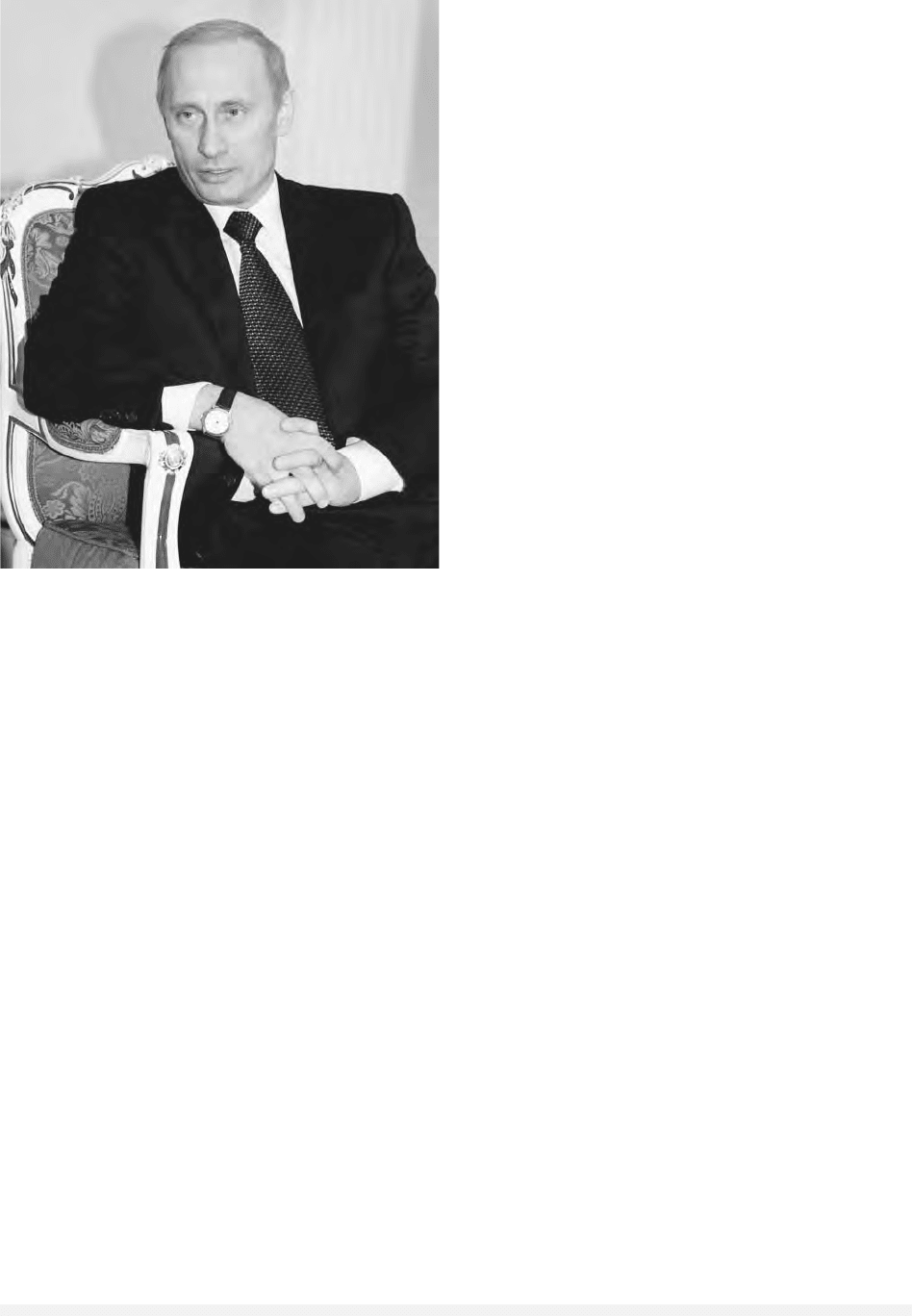Encyclopedia of Russian History
Подождите немного. Документ загружается.


and, according to Andrej Kodjak (1979), contain-
ing an encoded message concerning the Decembrist
uprising. Other works during this period include
his “Little Tragedies” (“The Avaricious Knight,”
“Mozart and Salieri,” “The Stone Guest,” and “Feast
in the Time of the Plague”), as well as “The Little
House in Kolomna,” “The Tale of the Priest and his
Workman Balda,” the last chapter of Eugene One-
gin, and some of his finest lyrics, including “The
Devils.” He married Goncharova in February 1831,
shortly after the unexpected death of Delvig, his
closest friend after Pushchin.
Pushkin’s marriage to Goncharova proved un-
happy. She had little appreciation for his work, and
he was unable to finance her extravagant lifestyle.
Pushkin was beset with financial worries, and
wrote little (including “Tale of the Golden Cockerel”
(1834), the cycle of poems “Stone Island” (Kamenny
ostrov, 1836) and his novel The Captain’s Daughter
(1836). He published a quarterly journal The Con-
temporary, which added to his troubles and did not
fare well.
Natalia Goncharova loved mingling with the
high aristocracy and playing society coquette; her
many admirers included the tsar. The flirtation
took on more serious tones when Baron Georges
Charles d’Anthès, a French exile living in St. Pe-
tersburg under the protection of the Dutch am-
bassador, began to pursue her in earnest. A duel
between d’Anthès and Pushkin took place on Feb-
ruary 10, 1837. Pushkin, severely wounded, died
two days later.
Of Pushkin’s works, Eugene Onegin is the best
known in the West, though by no means his sole
masterpiece. Written over the course of eight years,
it consists of eight chapters, each chapter broken
into numbered stanzas in iambic tetrameter. Nar-
rated by a stylized version of Pushkin himself, it
portrays a Byronic antihero, Eugene Onegin, a
bored society dandy who rejects the sincere and
somber Tatiana. Onegin then flirts casually with
Tatiana’s sister Olga, provokes a duel with his
friend Vladimir Lensky, a second-rate poet infatu-
ated with Olga, and kills Lensky in the duel. After
some travels, Onegin returns to Petersburg to find
out that Tatiana has married a wealthy general. He
falls in love with her, but she rejects him out of
loyalty to her husband. The work holds immense
popular and scholarly appeal thanks to the play-
fulness and perfection of the verse, the layers of
confession and commentary, the appeal of the
heroine, and the complex element of prophecy of
Pushkin’s own death.
See also: DECEMBRIST MOVEMENT AND REBELLION;
DERZHAVIN, GAVRYL ROMANOVICH; GOLDEN AGE OF
RUSSIAN LITERATURE; PUSHKIN HOUSE
BIBLIOGRAPHY
Bethea, David M. (1998). Realizing Metaphors: Alexander
Pushkin and the Life of the Poet. Madison: University
of Wisconsin Press.
Binyon, T. J. (2002). Pushkin: A Biography. London:
HarperCollins.
Evdokimova, Svetlana. Pushkin’s Historical Imagination.
New Haven, CT: Yale University Press.
Greenleaf, Monika. (1994). Pushkin and Romantic Fash-
ion: Fragment, Elegy, Orient, Irony. Stanford, CA:
Stanford University Press.
Pushkin, Alexander Sergeyevich. (1983). Complete Prose
Fiction, tr. Walter W. Arndt and Paul Debreczeny.
Stanford, CA: Stanford University Press.
Pushkin, Alexander Sergeyevich. (1991). Eugene Onegin,
reprint ed., tr. Vladimir Nabokov. Princeton, NJ:
Princeton University Press.
Vitale, Serena. (1999). Pushkin’s Button, tr. Ann Gold-
stein and Jon Rothschild. New York: Farrar, Straus
and Giroux.
D
IANA
S
ENECHAL
PUSHKIN HOUSE
Pushkin House (Pushkinsky Dom), the Institute of
Russian Literature of the Russian Academy of Sci-
ences (abbreviated in Russian IRLI RAN), was
founded in St. Petersburg, in 1905 and named af-
ter Alexander Sergeyevich Pushkin (1799–1837).
The idea of creating a new monument to Rus-
sia’s premiere poet came about during the celebra-
tion of his centenary in 1899 and the Pushkin
Exhibit organized by the Academy in May of that
year. By 1907 the task of this monument supported
by literary societies, theaters, and other groups
from around Russia had evolved into gathering
manuscripts, artifacts, and collections of works of
prominent Russian authors. The acquisition of
Pushkin’s personal library in 1906 with govern-
ment funds laid the foundation for the institute’s
library. At this time Pushkin House occupied tem-
porary space at the Academy’s main building while
the search for a permanent location continued.
World War I and the February and October Revo-
lutions delayed the process but also increased the
institute’s holdings, especially those of the manu-
PUSHKIN HOUSE
1253
ENCYCLOPEDIA OF RUSSIAN HISTORY

script department. Among important additions were
the archives, saved from the burning building of the
gendarmes’ headquarters in February 1917, of the
tsar’s secret police, documenting police surveillance
of Pushkin and other nineteenth-century writers;
Pushkin and Lermontov museum collections trans-
ferred in 1917 from the Lyceum in Tsarskoye Selo
for safekeeping; and the Paris museum collection of
A. F. Onegin contracted for in 1909 and transferred
to Pushkin House in 1927, after the owner’s death.
Pushkin House became a member institute of the
Academy in 1918 and eventually received its own
building in 1927, the old customs house at 2
Tuchkov Embankment (now Makarov Embank-
ment). Thanks in part to the protection of Soviet
writer Maxim Gorky, Pushkin House was able to
continue acquiring manuscripts and literary mem-
orabilia in the 1920s and 1930s. Publishing of
scholarly works on Russian literature, source texts,
textology, bibliography and the study of literary
history, catalogs, and periodicals got underway in
the 1920s. Since then, the academic editions of com-
plete works by authors such as Pushkin, Dosto-
evsky, Tolstoy, Gogol, and Lermontov produced by
the institute have been considered authoritative and
are used and cited by scholars around the world.
Pushkin House continued to operate during the
siege of Leningrad during World War II, although
most of the manuscripts and staff were evacuated
to cities in the country’s interior. The institute re-
turned to the job of preparing specialists after the
war and continues to train graduate and post-
graduate students in Russian literature, awarding
degrees in Russian literature (Ph.D. equivalent and
professorship). The structure of the institute is di-
vided into ten departments, including medieval
Russian literature, oral poetry and audio archive,
modern Russian literature (eighteenth and nine-
teenth centuries), Pushkin department, new Russ-
ian literature (twentieth century), Russian and
foreign literary ties, manuscript department and
medieval manuscript repository, library, and liter-
ary museum. After the fall of the Soviet Union in
1991, Pushkin House, like most government insti-
tutions, experienced serious funding deficits but
rapid expansion of cooperation with foreign schol-
ars and universities that led to foreign grants, joint
publishing projects, exchanges, and international
conferences.
See also: ACADEMY OF SCIENCES; EDUCATION; PUSHKIN,
ALEXANDER SERGEYEVICH; UNIVERSITIES
V
ANESSA
B
ITTNER
PUTIN, VLADIMIR VLADIMIROVICH
(b. 1952), second president of the Russian Federa-
tion.
Vladimir Putin was appointed acting president
of the Russian Federation on December 31, 1999,
and on March 26, 2000, he was elected to the pres-
idency. Putin was born in Leningrad (now St. Pe-
tersburg). He attended school there and practiced
judo, eventually becoming the city champion. As a
boy, Putin dreamed of joining the secret police
(KGB). When he was seventeen he went to KGB
headquarters and asked a startled officer what he
should do to “join up.” He was told to attend the
university and major in law. Putin took his advice
and attended Leningrad State University. In his sec-
ond semester one of his teachers was Anatoly
Sobchak, a man who would play a major role in
his life. In 1974 Putin was offered a job in the KGB
but told he had to wait a full year before entering
the organization. In 1976 Putin was assigned to
the First Directorate, the section engaged in spying
outside of the USSR. In 1983 he married Ludmila
Schkrebneva, a former airline hostess. Putin had
hoped to be stationed in West Germany, but in-
stead, in 1985, he was assigned to Dresden, in East
Germany. While it is unclear what he did there, all
indications are that he focused on recruiting visit-
ing West German businessmen to spy for the USSR.
In any case, he left as a lieutenant colonel, sug-
gesting that his spying career was less than spec-
tacular.
In May 1990 Putin’s former professor Anatoly
Sobchak was elected mayor of St. Petersburg, and
he asked Putin, who was well aware that both the
USSR and the KGB were falling apart, to come work
for him. Putin agreed, left the KGB, and by all ac-
counts impressed everyone he met with his ability
to “get things done.” He was efficient, effective,
honest, and decent to the people he interacted with,
characteristics that were in short supply at that
time. When Sobchak lost the mayoralty in the
election of July 1996, Putin quit, but unknown to
him he had been noticed by Anatoly Chubais, who
helped him obtain a job with Paul Borodin, who
ran the presidential staff in the Kremlin. As a re-
sult, he moved to Moscow.
Few people would have given the rather face-
less and bland Putin much chance of being noticed
by President Boris Yeltsin. Yet he did stand out, per-
haps because he was so efficient. Equally impor-
tant, he did not appear to be seeking higher office.
PUTIN, VLADIMIR VLADIMIROVICH
1254
ENCYCLOPEDIA OF RUSSIAN HISTORY

Yeltsin took note of Putin and in 1998 appointed
him head of the Federal Security Service, formerly
the KGB. Then, on August 16, 1999, Yeltsin sur-
prised the world by making Putin prime minister
and designating him as his successor. If that was
not enough, Yeltsin once again surprised the world
on December 31, 1999 by resigning and making
Putin acting president. On March 26, 2000, Putin
stood for election and won a majority in the first
round.
Putin was a new kind of president. While Boris
Yeltsin had presided over the collapse of commu-
nism and in that sense was a revolutionary leader,
Putin saw the job differently. Russia had been
through enough turmoil and conflict since the col-
lapse of the USSR. Besides, the country was in a
mess. The economy had come close to collapse, cor-
ruption and social problems were rampant, cyni-
cism toward the central government was at an
all-time high, and on the international level, Rus-
sia was almost irrelevant with U.S.-Russian rela-
tions at an all-time low. It is not an exaggeration
to suggest that Russia was considered by many to
be “the sick man of Europe.”
Putin’s approach to these many problems con-
trasted markedly with Yeltsin’s. He was very or-
ganized and structured, and as his Millennium
Speech (January 1, 2000) made clear, he stood in
stark contrast to his Soviet predecessors. He told
the Russian people the truth about the depth and
seriousness of the country’s problem. In addition
to taking this straightforward approach, Putin be-
lieved that the only way Russia could survive as a
viable nation was to rebuild the Russian state. So
he immediately began to reestablish Moscow’s con-
trol over the country’s governors, many of whom
were paying little attention to the central govern-
ment. First, he took on the Federation Council, the
parliament’s upper house, where the regional gov-
ernors held considerable power. By the time Putin
was through, considerable power had been shifted
to Moscow. Then he set up seven “super” districts,
headed by personally selected “super” governors, to
oversee the regional officials. He even succeeded in
firing one of the country’s most corrupt and
strongest governors, Yegeny Nazdratenko of Pri-
morski Krai.
The Putin style of governance avoided spectac-
ular, high-profile actions. Instead, he preferred to
work behind the scenes whenever possible. In his
view, there had already been too much of the kind
of high-profile activity associated with Yeltsin.
Russia was tired of that sort of thing, which in the
end generally made very little difference in the life
of the average citizen. Military reform provides an
example of Putin’s approach. How to restructure
Russia’s armed forces had been a subject of discus-
sion ever since the collapse of the Soviet Union—
and even before then. When Putin appointed Sergei
Ivanov, one of his closest associates, as defense min-
ister, there was some expectation that he would
immediately try to institute major changes. In fact,
that did not happen. Instead, Putin pushed the De-
fense Ministry to make changes, and it has grad-
ually responded.
Putin’s style of governance was not repressive,
but neither was it democratic in the way the term
was understood in the West. Instead, he followed
a course of what might be called “managed democ-
racy.” He set the parameters of what was permit-
ted and what was prohibited. As long as citizens
remained within the parameters, they would have
all the freedom they wanted. But if they went be-
yond the parameters, they would be in trouble. For
PUTIN, VLADIMIR VLADIMIROVICH
1255
ENCYCLOPEDIA OF RUSSIAN HISTORY
Ex-KGB agent Vladimir Putin became Russia’s second president.
© R.P.G./C
ORBIS
S
YGMA
. R
EPRODUCED BY PERMISSION
.

example, when Putin took on the media, he made
it clear that the “chaotic” press and television of the
Yeltsin period was unacceptable. While the media
remained free in comparison to the Soviet era, the
situation was a far cry from the independent news
coverage of the 1990s.
Putin did not have a grand plan for the re-
structuring of society. He was a problem-solver.
Rather than instituting a full-scale reform of the
judicial system, for instance, he raised the salaries
of judges and increased the money available to the
police. The same was true of an even more serious
problem, the tax system. The government was
bankrupt because no one was paying taxes. Putin
dealt with the problem by introducing a 13 per-
cent flat tax to be paid by everyone, and the sys-
tem seemed to work relatively well. There were still
major problems in both areas, but as was typical
of Putin, important if partial changes had been im-
plemented.
Putin was also an effective diplomat. When
George W. Bush became president of the United
States, it looked as if U.S.-Russian relations were
going nowhere. Putin showed he had patience.
When the terrorist attack on the World Trade Cen-
ter in New York occurred on September 11, 2001,
he was the first foreign leader to call President Bush
and express his condolences. He also stood by the
United States during the subsequent war in
Afghanistan. Most surprising, however, was his
ability to remain a close friend and ally of the
United States even though he opposed the American
invasion of Iraq. In contrast to the Washington–
Paris relationship, Washington and Moscow re-
mained close allies despite their differences over
Iraq.
Putin also demonstrated that he knew how to
make use of events. For example, he used the Sep-
tember 11 attacks to force Russia’s anti-American
general staff to change its approach to dealing with
the United States. On September 24, 2001, just
prior to his visit to the United States, he met with
the country’s generals and admirals, and made it
clear that cooperation was the order of the day. The
military quickly fell into line and cooperation be-
tween the two sides was as close as it had ever been.
Many observers wondered whether Putin’s
partial but determined approach would provide the
political, military, social, and economic stability
Russia needed to reenter the ranks of the world’s
major powers. When his presidency began, Putin
was unknown, and few believed he could do any-
thing other than be a KGB thug. Within a short
time, without taking the repressive actions that
many expected, he had begun to reestablish the
Russian state and to restore its status as an im-
portant player in the international arena. The econ-
omy had begun to turn around, even if it continued
to be too heavily based on oil.
See also: SOBCHAK, ANATOLY ALEXANDROVICH; STATE SE-
CURITY, ORGANS OF; YELTSIN, BORIS NIKOLAYEVICH
BIBLIOGRAPHY
Herspring, Dale R., ed. (2003). Putin’s Russia: Past Im-
perfect, Future Uncertain. Boulder, CO: Rowman &
Littlefield.
Putin, Vladimir. (2000). First Person: An Astonishingly
Frank Self-Portrait of Russia’s President, Vladimir
Putin, tr. Catherine A. Fitzpatrick. New York: Pub-
lic Affairs.
Shevtsova, Lilia. (2003). Putin’s Russia. Washington, DC:
Carnegie Endowment for International Peace.
D
ALE
H
ERSPRING
PUTIN, VLADIMIR VLADIMIROVICH
1256
ENCYCLOPEDIA OF RUSSIAN HISTORY
President Vladimir Putin speaks during a 2002 meeting with
Kyrgyzstan president Askar Akayev. P
HOTOGRAPH BY
A
LEXANDER
Z
EMLIANICHENKO
/A
SSOCIATED
P
RESS
. R
EPRODUCED BY PERMISSION
.

PYTATAKOV, GEORGY LEONIDOVICH
(1890–1937), a leading Bolshevik in Ukraine who
opposed Vladimir Lenin’s policy on a nation’s right
to self-determination.
An extraordinary economic administrator,
Georgy Pytatakov held numerous important polit-
ical positions including deputy chairman of Gos-
plan (1922); deputy chairman of the Supreme
Council of the National Economy (VSNKh) (1923);
chairman of the State Bank (1929); deputy chair-
man of the Commissariat of Heavy Industry (1930);
and member of the Supreme Economic Council
(1930).
In the 1920s Pytatkov allied with Leon Trot-
sky and ultimately became a leading figure in the
Left Opposition (the so-called Trotskyite opposi-
tion). From 1922 to 1926 Pytatakov advocated
rapid industrialization and supported Yevgeny Pre-
obrazhensky’s theory of “primitive socialist accu-
mulation.” In a public bid for rank-and-file support
for the Left’s position, Pytatakov took part in a
demonstration at a Moscow factory Party meeting
in 1926. He was subsequently removed from his
position at VSNKh for being an oppositionist and
sent abroad. The following year he was expelled
from the Party.
In 1928 Pytatkov recanted his position and ap-
plied for readmission into the Party. It was granted
the following year, along with an appointment to
head the State Bank. Beginning in 1929 he pub-
lished articles hailing Josef Stalin’s genius and con-
demning oppositionists. However, this could not
erase the stigma of his association with the Left
Opposition. In 1936 he was arrested as a Trotskyite
and, along with Karl Radek, was a central figure in
the second Moscow Show Trial in 1937. Under tor-
ture and drugs, he confessed, was found guilty, and
shot immediately after the trial.
See also: LEFT OPPOSITION; TROTSKY, LEON DAVIDOVICH
BIBLIOGRAPHY
Conquest, Robert. (1990). The Great Terror: A Reassess-
ment. New York: Oxford University Press.
Khlevniuk, Oleg. (1995). In Stalin’s Shadow: The Career of
“Sergo” Ordzhonikidze. New York: M. E. Sharpe.
K
ATE
T
RANSCHEL
PUTIN, VLADIMIR VLADIMIROVICH
1257
ENCYCLOPEDIA OF RUSSIAN HISTORY
This page intentionally left blank

QUADRUPLE ALLIANCE AND
QUINTUPLE ALLIANCE
The Quadruple Alliance was signed in November
1815 by Russia, Britain, Austria, and Prussia, fol-
lowing the long series of wars that began in the
aftermath of the French Revolution and concluded
with the defeat of Napoleon. It was essentially a
continuation of the Treaty of Chaumont of 1814,
in which the four powers vowed to defeat France
and remain allied for twenty years to keep France
in check. At the time Russia was the preeminent
military power in Europe. From 1813 to 1814, Eu-
ropeans had watched with a mixture of amazement
and horror as Russian soldiers drove Napoleon’s
Grand Army out of their country and, joined by
Prussia, Britain, and finally Austria, all the way to
Paris. Britain ruled the seas, but no army rivaled
Russia’s, and fear of this new power was keen in
Austria and Britain until its disastrous defeat in the
Crimean War.
The individual most responsible for the com-
plete destruction of Napoleon’s power was Emperor
Alexander I (r. 1801–1825). The other continental
powers had been willing to negotiate a settlement
with Napoleon, but Alexander had insisted on to-
tal victory. Since at least 1805 he had been con-
vinced that only Russia and Britain had the
resources to vanquish Napoleon and reestablish or-
der in Europe based on a new treaty system.
With the final defeat of Napoleon in 1815, the
victorious powers faced two related problems: how
to contain France, and how to prevent revolution.
In November, the British foreign secretary, Vis-
count Castlereagh, proposed a continuation of the
alliance system, bolstered by a system of great-
power congresses to deal with crises as they arose.
Alexander’s vague response was a “Holy Alliance”
of Christian monarchs who would treat one an-
other with Christian brotherhood and charity. This
proposal had no practical effect.
Castlereagh had his way, and in the Quadru-
ple Alliance the victorious powers pledged to main-
tain the political system established at the Congress
of Vienna for the next twenty years, by force if
necessary, and to meet periodically to consult on
the maintenance of order and stability. The foreign
secretary declared that Britain would never inter-
vene militarily in the internal affairs of another
state. When Alexander pressed him to promise sup-
port for the restored Bourbon monarchy in France,
Q
1259

Castlereagh refused. This did much to fuel Alexan-
der’s suspicions of British policy.
As Alexander’s anti-British feelings grew, he
came to regard France in a more favorable light.
Prodded by his advisers, particularly Corfiote
Capodistrias, he concluded that if France were ad-
mitted into the Quadruple Alliance, it could become
a counterweight to Britain and, to a lesser extent,
Austria, especially if Prussia continued to follow
Russia’s diplomatic lead.
The result was the Congress of Aix-la-Chapelle
in 1818. Ostensibly convened to end the military
occupation of France, it really had the goal of
restoring France into the great-power system. Its
outcome was twofold: France joined the alliance,
which became the Quintuple Alliance, but the
Quadruple Alliance was reconfirmed because the
victors, despite their mutual distrust, were still
fearful of a resurgent France. Over the next few
decades, however, fear of Russian power and ex-
pansionism would seize all the great powers except
Prussia, until they united to defeat Russia in the
Crimean War.
See also: CRIMEAN WAR; HOLY ALLIANCE; NAPOLEON I;
VIENNA, CONGRESS OF
BIBLIOGRAPHY
Albrecht-Carrie, Rene. (1958). A Diplomatic History of Eu-
rope Since the Congress of Vienna. New York: Harper.
Bridge, F.R., and Bullen, Roger. (1980). The Great Powers
and the European States System: 1815–1914. New
York: Longman.
Jelavich, Barbara. (1974). St. Petersburg and Moscow:
Tsarist and Soviet Foreign Policy: 1814–1974. Bloom-
ington: Indiana University Press.
H
UGH
P
HILLIPS
QUADRUPLE ALLIANCE AND QUINTUPLE ALLIANCE
1260
ENCYCLOPEDIA OF RUSSIAN HISTORY

RABBINICAL COMMISSION
The Rabbinic Commission (1848–1910) was a con-
sultative body under the Ministry of Internal Af-
fairs (specifically the Department of Spiritual
Affairs for Foreign Faiths), organized to deal with
matters of the Jewish faith. Its creation conformed
to the general state policy of centralizing the reli-
gious administration of foreign confessions in a
single department. Its primary duties were to an-
swer inquiries from the state about Jewish laws
and customs, to supervise the activities of rabbis,
and to examine controversial Jewish divorce suits.
While the state had created this institution to gather
information about internal Jewish life, the Com-
mission gradually transformed into a higher court
of appeals for private divorce cases (which remained
under rabbinical jurisdiction until 1917) and a ve-
hicle for preserving traditional religious and fam-
ily values.
The changing profile of the Commission’s mem-
bers reflected the transformation in its mission and
identity. The first session (1852) included obscure
individuals who were well versed neither in the Russ-
ian language nor Jewish law: the merchant Bern-
shtein (Odessa), D. Orshansky (Poltava), Shimel
Merkel (Kovno province), and Dr. Cherolzon (Os-
zeisky province). They examined queries about the
censorship of Jewish books, Hasidic sects, the Jew-
ish oath, registration, and marriage of Jewish sol-
diers. The second meeting (1857) involved more
prominent Jews: Dr. Abraham Neumann (Riga), the
merchant Yekutiel-Zisl Rapoport (Minsk), the mer-
chant Chlenov, (Kremenchug), and Rabbi Yakov
Barit (Vilna). Among other topics, they discussed the
establishment of state schools for Jewish girls.
In addition to the previous members, the third
session (1861–1862) included Itskhok Eliiagu
(Eliyahu) Landau (Kiev), German Barats (Vilna),
and A. Maidevsky (Poltava), Iosef Evzel Gintsburg,
and two learned Jews from the Ministry of the Peo-
ple’s Education—Iosif Zeiberling (St. Petersburg)
and Samuel Iosif Fin (Vilna). The Commission ex-
amined ten cases on Jewish religious life and its
first divorce case.
The fourth session (1879) was an “assembly of
rabbis without rabbis.” Apart from state rabbi Ger-
man Faddeyevich Blyumenfeld (Odessa) and Dr.
Avraham Harkavy (an Orientalist), the others were
secular professionals: Hirsh Shapiro (Kovno), Zelman
Lyubich (Minsk), Meier Levin (Pinsk), Baron Goratsy
Gintsburg (Kiev), and I. I. Kaufman (Odessa). They
examined eight cases of divorce and bigamy.
R
1261

The fifth session (1893–1894) reflected the ag-
gressive campaign of the Jewish Orthodox leadership
to reassert their authority and preserve tradition.
It involved four enlightened Jews (German Barats,
Iakov Gottesman, Samuil Simkhovich, Avraam
Katlovker) and three prominent Orthodox leaders:
rabbis Tsvi Rabinovich (Vilna), Samuel Mogilever
(Grodno), and theologian Yuriya Mileikovsky
(Mogilev). They examined twenty-seven cases on
marriage, divorce, and religious rituals.
The final sixth session (1910) was a victory for
the Orthodox camp, which promised to wean Jews
from revolutionary activities. Save for one jurist,
Moisie Mazor (Kiev), the others were rabbis: Yehuda
Leib Tsirelson (Kishinev), Khaim Soloveichik (Brest-
Litovsk), Oizer Grodzensky (Vilna), Sholom Shneer-
son (Liubavich), Shmuel Polinkovsky (Odessa), and
Mendel Khein (Nezhin). They examined twenty-
three cases on marriage and divorce, as well as ques-
tions about burials, cemeteries, spelling of Jewish
names, oaths, and censorship of books.
Although the Rabbinic Commission only met
six times, it addressed key religious and family is-
sues that plagued Russian Jewry. The shift in in-
fluence from the enlightened to Orthodox camp
brought a reassertion of traditional values, includ-
ing the refusal to modify Jewish law to suit mod-
ern expectations. The state ceased to convene the
Rabbinic Commission as the empire descended into
war and revolution.
See also: JEWS
BIBLIOGRAPHY
Freeze, ChaeRan Y. (2002). Jewish Marriage and Divorce
in Imperial Russia. Hanover, NH: University Press of
New England.
C
HAE
R
AN
Y. F
REEZE
RABKRIN
Rabkrin is the contracted name of Narodnyi Kom-
missariat Raboche–Krest’ianskoi Inspektsii (The Peo-
ple’s Commissariat of the Workers’ and Peasants’
Inspection), the Soviet governmental institution re-
sponsible between 1920 and 1934 for overseeing
state administration.
On February 7, 1920, the Soviet Central Exec-
utive Committee established Rabkrin to succeed the
People’s Commissariat for State Control (estab-
lished December 3, 1917). It was charged with
ensuring the effectiveness of government adminis-
tration and monitoring the implementation of state
decrees. The former commisar of state control,
Josef Stalin, remained in charge of Rabkrin until he
was replaced in April 1922 by A. D. Tsyurupa.
The Soviet leadership soon became concerned
that Rabkrin was failing to halt the growth of bu-
reaucraticism, mismanagement, and corruption in
the government apparatus. In April 1923, Rabkrin
was merged with the Communist Party’s Central
Control Commission under Valerian Vladimirovich
Kuibyshev. The new body was given the broad task
of supervising and rationalizing the administration
of all party, state, and economic functions. From
November 1926 to November 1930, Stalin’s close
ally, Sergo Ordzhonikidze, headed the joint control
agency, which became a powerful political weapon
for the consolidation of Stalin’s power. In 1928, it
was charged with overseeing implementation of the
First Five-Year Plan, and played a major role in pro-
moting unrealistically ambitious industrial planning
and militaristic campaign methods of economic ad-
ministration. In November 1930, Andrei Andreye-
vich Andreyev succeeded as head of the joint control
agency until October 1931, when he was replaced
by Yan Ernestovich Rudzutak. To strengthen the
power of the economic commissariats, the Seven-
teenth Party Congress (1934) dissolved Rabkrin and
transferred its functions to an emasculated Com-
mission for State Control, attached to Sovnarkom
and separate from the new Commission for Party
Control subordinated to the Central Committee.
See also: CENTRAL CONTROL COMMISSION; SOVNARKOM;
STALIN, JOSEF VISSARIONOVICH
BIBLIOGRAPHY
Rees, E. A. (1987). State Control in Soviet Russia. The Rise
and Fall of the Workers’ and Peasants’ Inspectorate,
1920-1934. Basingstoke: Macmillan.
N
ICK
B
ARON
RACHMANINOV, SERGEI VASILIEVICH
(1873–1943), one of the most famous of Russian
composers.
Sergei Vasilievich Rachmaninov was born in
Oneg, Russia. He first established himself with his
much-performed Prelude in C Sharp Minor, presented
RABKRIN
1262
ENCYCLOPEDIA OF RUSSIAN HISTORY
